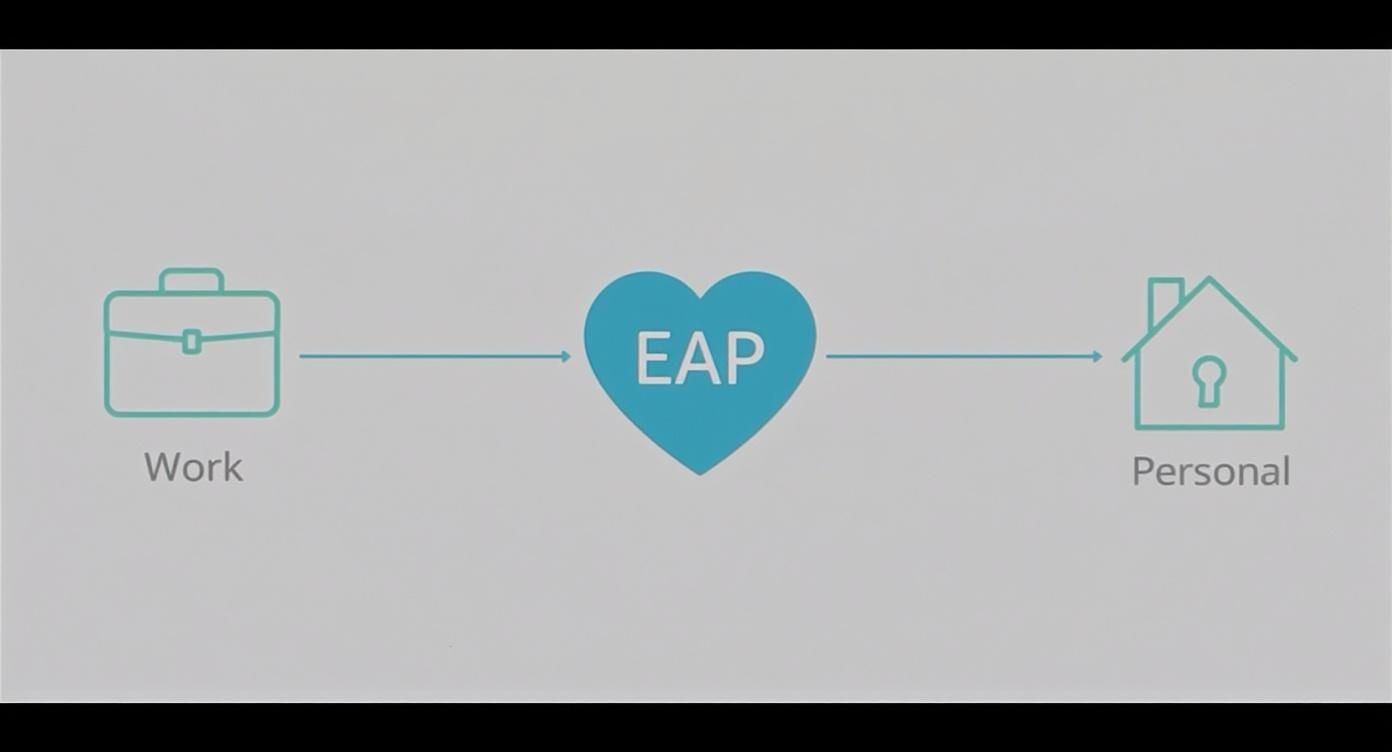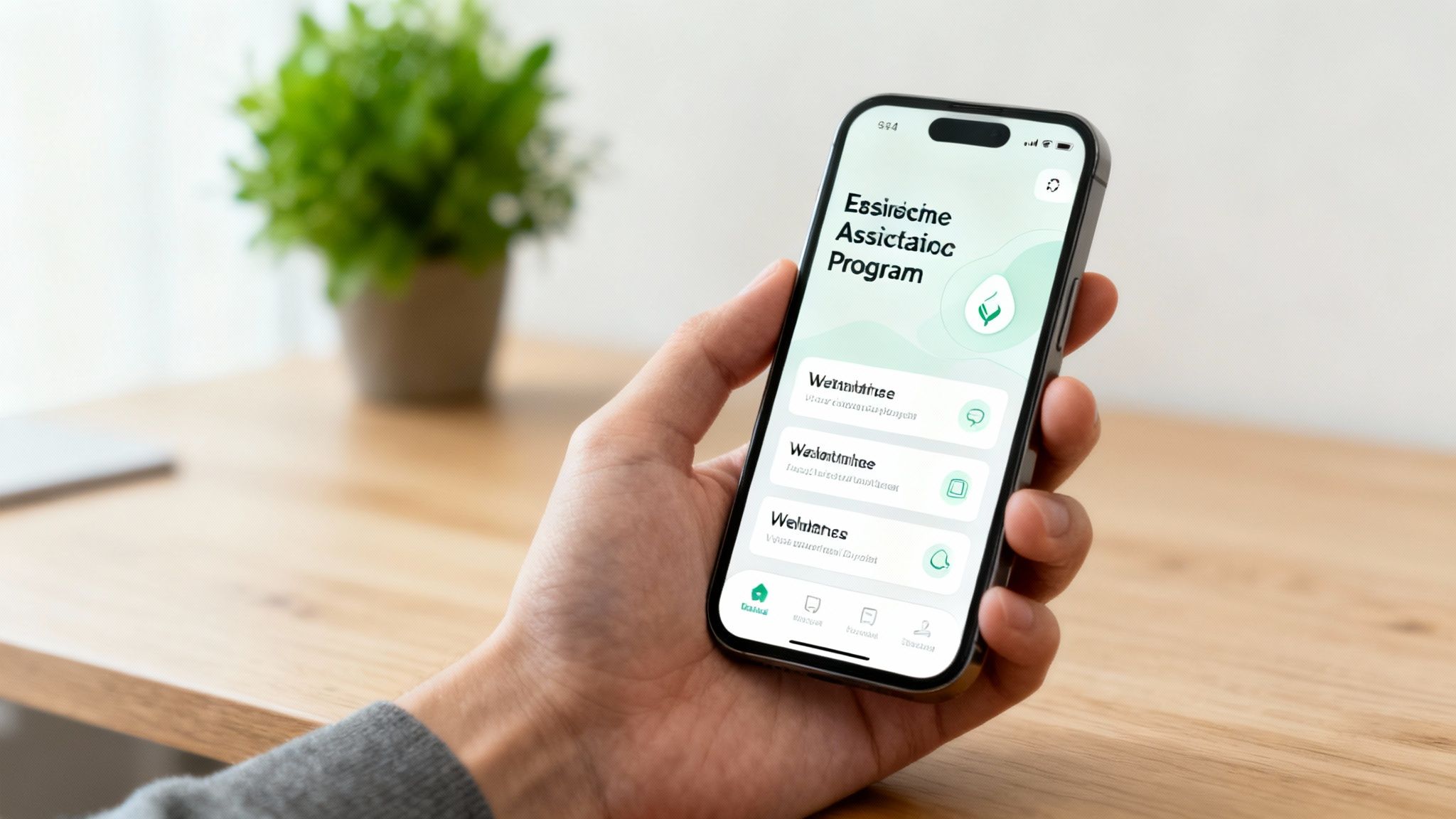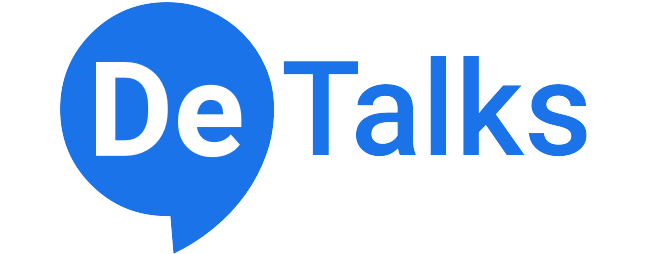An Employee Assistance Programme offers confidential, professional support for life's hurdles—both at work and at home. It is a proactive and compassionate resource, offered at no cost to you, designed to help manage stress and build well-being.
What Exactly Is an Employee Assistance Programme?
Think of an Employee Assistance Programme (EAP) as a confidential support system, fully paid for by your employer, created to help you navigate life’s ups and downs. It’s a private and safe space to connect with experts who can guide you through a wide range of challenges.
This could be anything from managing workplace stress and dealing with anxiety, to getting advice on personal matters that are weighing on you.
The key word here is confidentiality. Your conversations are completely protected, which means you can seek support without worrying about privacy. Employers offer this because they understand that your overall well-being matters, and they see reaching out for help as a sign of strength.
A Toolkit for Everyday Well-being
An EAP isn't just for a crisis; it’s a practical toolkit for everyday life that supports both challenges and growth. The aim is to give you easy access to resources that support your mental and emotional health, whether that’s short-term therapy, counselling, or guidance.
Here are a few common areas where an EAP can lend a hand:
- Mental Health Support: Guidance for managing feelings of anxiety, depression, or burnout.
- Workplace Challenges: Help with navigating on-the-job stress, conflicts with colleagues, or career pressures.
- Personal and Family Issues: Support for relationship difficulties, parenting concerns, or coping with grief.
- Financial and Legal Guidance: Initial consultations to help point you in the right direction.
An EAP is a compassionate first step. It empowers you to tackle concerns early, helping you build resilience, compassion, and happiness before challenges grow too large. The assessments offered are informational tools to guide your journey, not clinical diagnoses.
Here in India, we're seeing a growing commitment to employee well-being, with many companies increasing their wellness spending.
Despite this investment, EAP usage often remains low, showing how important it is for us to better understand and embrace these valuable programmes. You can explore more about EAP trends in India to see how organisations are adapting.
The takeaway is simple: your EAP is there to help you grow, cope, and ultimately, thrive.
How EAPs Directly Support Your Mental Well-Being
An Employee Assistance Programme (EAP) is a confidential support line for your mental and emotional health. It gives you a direct, private path to licensed professionals who can help you work through challenges like workplace stress, anxiety, or burnout.
In one-on-one sessions, you can learn practical coping skills and build the kind of resilience that helps you not just get by, but genuinely thrive. This kind of therapy or counselling is an incredible tool for personal growth, and reaching out is a sign of strength.
From Navigating Challenges to Fostering Happiness
But an EAP isn't just for difficult moments; it’s also for proactively building a more positive life. It helps you shift from only managing problems to actively cultivating happiness, resilience, and self-compassion.
It's also important to know that any initial assessments are for informational purposes. They are not clinical diagnoses but helpful guides to understand your needs and find the best path forward.
An EAP is designed to be a safe harbour. It offers a confidential space where you can speak freely, process your thoughts, and gain new perspectives on whatever is on your mind, empowering you to take control of your well-being.
This visual map shows how an EAP acts as a central hub, connecting confidential support to both your work and personal life.

The key takeaway is that an EAP integrates support across all areas of your life, reinforcing that personal wellness and professional performance are deeply connected.
Building Resilience and a Healthier Workplace
When people have the right tools to manage their mental health, the ripple effect is felt across the entire organisation. In India, EAPs have shown a remarkable return on investment by improving employee mental health and reducing productivity losses.
This focus on well-being helps address challenges like anxiety and depression early, creating a more stable and supportive environment for everyone.
The table below breaks down the wide range of support an EAP typically offers, showing just how versatile this resource can be.
How EAPs Support Employee Well-being
| Area of Support | Common Challenges Addressed | Potential Positive Outcome |
|---|---|---|
| Mental Health | Stress, anxiety, depression, burnout, trauma | Improved emotional regulation, resilience, coping skills |
| Work-Life Balance | Time management, caregiver stress, personal responsibilities | Reduced feelings of being overwhelmed, better focus at work |
| Relationship Issues | Marital conflict, family problems, workplace disagreements | Stronger communication skills, healthier relationships |
| Financial Well-being | Debt management, budgeting, financial planning stress | Increased financial literacy and reduced money-related anxiety |
| Legal Guidance | Divorce, tenancy issues, will preparation | Clarity on legal rights and a clear path forward |
| Addiction & Substance Use | Alcohol or drug dependency, behavioural addictions | Access to recovery resources and ongoing support |
As you can see, the support is holistic, addressing the many interconnected parts of an employee's life.
By their very nature, EAPs are instrumental in reducing absences related to mental health. As you build your own resilience, you're also contributing to a healthier, more positive workplace culture. It's worth exploring other strategies for reducing mental health absence to see how individual support lifts the entire team.
Ultimately, the benefits of an employee assistance programme are both personal and profound, offering supportive takeaways for a more balanced life.
The Business Case for Investing in Employee Wellness
An Employee Assistance Programme (EAP) is more than a perk; it is a strategic investment in your team and your business. When you give your team tools to manage their well-being, the positive effects ripple across the entire organisation.
This kind of support has a direct, measurable impact on business outcomes. A team that feels genuinely cared for is more engaged, focused, and motivated, creating a powerful cycle of productivity and growth.

Tackling Absenteeism and Turnover
When an employee is navigating workplace stress, anxiety, or personal difficulties, it often leads to sick days and disengagement. An EAP offers a confidential lifeline, providing professional counselling and support to find real solutions.
Moreover, a culture of genuine support is a powerful way to retain talent. People are far more likely to commit to a company that invests in their total well-being, lowering the costs of high staff turnover.
Driving Productivity and Engagement
A person's mental state and their performance at work are deeply connected. Challenges like anxiety or depression can make it difficult to concentrate, collaborate, or innovate.
By providing an EAP, you give people practical tools to navigate these issues, freeing them up to be their most effective selves. This helps prevent burnout and cultivates a more energetic and driven workforce.
Investing in an EAP sends a clear message: we see you as a whole person, not just a role. This builds the trust and loyalty that form the foundation of a resilient, high-performing organisation.
Building a Resilient Organisation
A compassionate and supportive culture is the bedrock of any adaptable business. An EAP is a cornerstone for building this resilience, giving your team essential coping strategies for today's fast-moving world.
Consider the long-term returns on this investment: better morale, a stronger reputation for attracting talent, and potentially lower long-term healthcare costs.
Ultimately, offering employee assistance program benefits is about creating a workplace where people can thrive. It shows a deep commitment to your team's health, building a compassionate culture where people and business can flourish.
How EAPs Are Evolving for the Modern Workforce
Today's Employee Assistance Programmes have transformed into dynamic, digital-first well-being platforms. This evolution makes support more accessible, private, and seamlessly integrated into our daily routines than ever before.
Technology is the real game-changer here, knocking down old barriers to getting help. Many modern EAPs are built around mobile apps that put confidential therapy and counselling sessions right at your fingertips, which is a massive plus for remote or hybrid work across India.

From Reactive Support to Proactive Well-being
The biggest shift is in the mindset from reactive to proactive care. New EAPs give you the tools to build mental fitness every day, long before burnout or severe workplace stress can take hold.
This approach puts you in the driver's seat of your own mental health journey, offering resources that fit your life.
- Virtual Workshops: Live and on-demand sessions on topics like building resilience, managing anxiety, and practising mindfulness.
- Self-Paced Resources: Libraries of articles, guided meditations, and assessments to help you better understand your emotional health.
- Digital Check-ins: Simple tools to monitor your mood and spot patterns, so you can address small issues before they grow.
It’s worth noting that any assessments on these platforms are for your information only, not for diagnosis. They are simply guides to help you understand yourself and point you towards the right support.
The Rise of Data-Informed, People-Focused Care
Technology also gives organisations a way to understand well-being trends without compromising privacy. By looking at anonymised data, a company might spot rising stress levels and proactively offer a workshop on coping with pressure.
This responsive approach is fuelling huge growth in the EAP market globally, with India being a significant part of this expansion. You can learn more about the EAP market’s projected growth and the tech behind it.
The evolution of EAPs marks a huge step forward in making mental health support more approachable. By making it discreet and easy to access, these programmes empower more people to prioritise their well-being.
The modern EAP offers a supportive, confidential space to not only navigate challenges like anxiety or depression but also to build skills for a happier, more resilient life.
Breaking Down the Barriers to Using Your EAP
An Employee Assistance Programme is a fantastic resource, but often goes unused. The biggest hurdles are often the invisible walls we build around asking for help, like stigma or confusion about privacy.
Reaching out takes courage when you're struggling with workplace stress or a personal issue. Let's gently pull back the curtain on these common barriers and make EAPs feel more approachable for everyone.
For Employees: Let's Bust Some Common Myths
One of the first questions on anyone's mind is, "Will my boss find out?" The answer is a firm no. Your conversations are 100% private and protected, just like any session with a therapist or counsellor.
Your company only ever sees high-level, anonymous data—like the total number of people who used the service. They never see your personal details.
Another hurdle is thinking EAPs are only for major crises. While they are a lifeline in tough times, they’re just as valuable for everyday challenges and personal growth, helping you build resilience before small stresses become bigger issues like anxiety or depression.
Think of your EAP as a confidential coach for your personal well-being. Using it isn't about admitting defeat; it's about being proactive and using a resource designed to help you become stronger.
For Employers: How to Foster a Truly Supportive Culture
Organisations have a huge part to play in knocking down these barriers. Engagement begins when you build a culture where reaching out for support is seen as a sign of strength.
Here are a few practical strategies that companies in India and around the world can use:
- Talk About it Often: Weave reminders into company newsletters, mention it in team meetings, and highlight it during wellness campaigns. Make sure contact info is always easy to find.
- Get Leaders on Board: When leaders openly discuss the importance of mental health, it changes the conversation and breaks down stigma faster than any policy.
- Train Your Managers: Ensure managers understand the EAP's benefits and strict confidentiality rules, so they can confidently guide their team members toward this resource.
Closing the gap between having an EAP and using it is a team effort. By tackling myths and building a compassionate workplace, we can ensure these powerful programmes deliver their intended employee assistance program benefits.
Choosing the Right EAP for Your Organisation
For HR leaders, picking an Employee Assistance Programme is a significant decision for your team’s well-being. It's less about hiring a vendor and more about finding a partner who becomes an extension of your company's culture.
The right fit means looking closely at what a provider offers. A good programme should provide professional counselling for mental health issues like anxiety and workplace stress, as well as practical support for financial or legal situations.
Key Criteria for Selecting Your EAP Partner
When looking at providers, it helps to have a clear set of criteria. The aim is to find a provider whose values mirror your own and who understands the specific context of your team in India.
Here are a few essential factors to consider:
- Cultural Relevance: Does the provider understand India's diverse landscape? Their network of counsellors should be familiar with local contexts and speak regional languages.
- Digital Accessibility: A seamless mobile app and online portal are essential for hybrid teams. Getting help should be easy, no matter where employees are.
- Commitment to Confidentiality: This is a deal-breaker. A provider must have an ironclad commitment to protecting employee data and ensuring every conversation remains private.
- Proactive Well-being Tools: Look for tools that help your team build resilience before a crisis hits, like workshops and self-help resources. Remember, any assessments are informational guides, not a formal diagnosis.
The best EAP is one that feels like a trusted, approachable resource, not a faceless corporate benefit. It should be just as easy for a remote employee in Pune to use as it is for someone in your Mumbai head office.
A great partnership doesn’t stop once the contract is signed. A top-tier provider will collaborate with you on a thoughtful launch plan and supply ongoing materials to keep the EAP top-of-mind and build trust.
Got Questions About EAP Benefits? Let's Clear Things Up
It’s completely normal to have questions when you first hear about an Employee Assistance Programme (EAP). Understanding how it works is the first step toward feeling confident enough to use it.
Our goal here is to pull back the curtain on EAPs. We want you to see it as a personal, supportive tool you can turn to whenever you need it.
Is This Really Confidential?
Absolutely. Confidentiality is the foundation of any good EAP.
Your employer will never know that you’ve reached out for help or what’s discussed during therapy or counselling sessions. They only see high-level, anonymous data, while your personal details are always kept private.
What Can I Actually Talk to an EAP Counsellor About?
Honestly, you can talk about almost anything that’s on your mind. EAPs are built to help with the full spectrum of life's challenges.
Whether you're dealing with workplace stress, grappling with anxiety or depression, or need advice on personal matters, they can help. No problem is too small if it's affecting your well-being.
Think of your EAP as a safe starting point. The support is designed to be informational and empowering, helping you find the right path forward rather than providing a formal clinical diagnosis.
Do I Have to Pay for This?
Nope. The EAP is a benefit paid for entirely by your employer. Core services like short-term counselling are available to you—and often your immediate family—at no cost.
If you need more specialised or long-term support, your EAP counsellor will help you navigate your options. They can connect you with affordable resources through your health plan or community programmes.
The bottom line is that an EAP offers accessible, confidential, and professional support when you need it most. It's a supportive takeaway to handle life’s challenges and build a greater sense of well-being.
At DeTalks, we believe everyone deserves access to the right mental health support. Our platform connects you with qualified therapists and provides science-backed assessments to guide your journey toward resilience and clarity. Explore your path to well-being with us at https://detalks.com.





